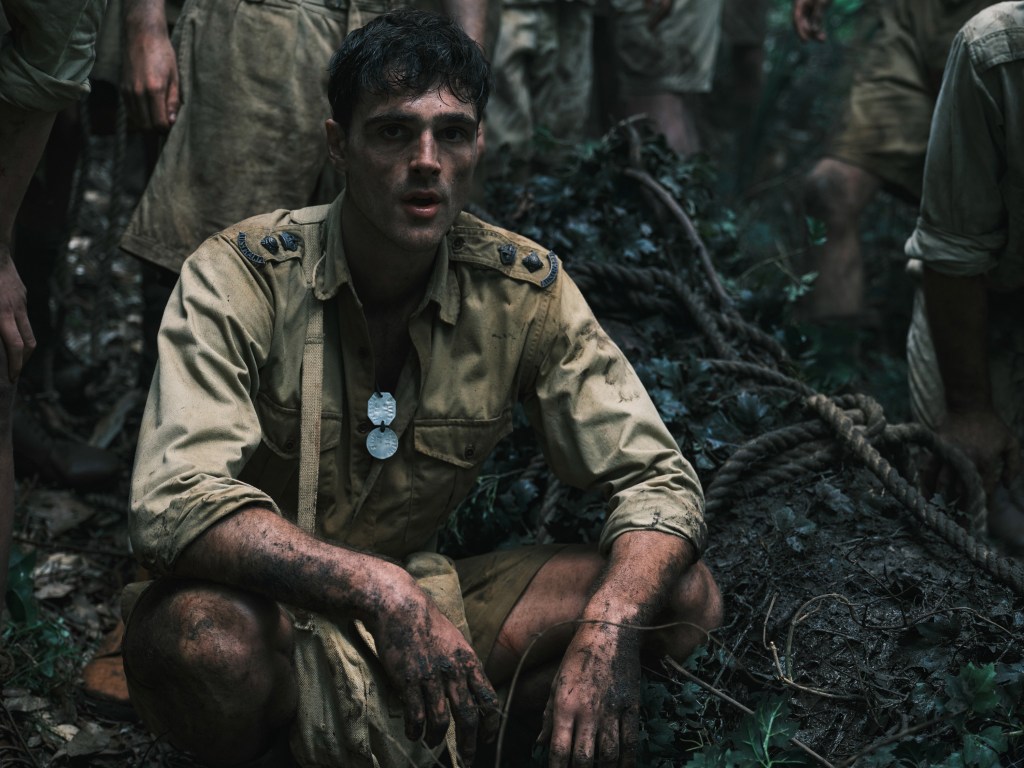To this day, Kanchanaburi remains a hot destination — in every sense — for Australian and British tourists who come to pay tribute to prisoners of war who died under the Japanese lash, building the Burma Railway. Kanchanaburi is where the bridge crosses the River Kwai, subject of one of the most beloved war stories in cinema. The real sufferings of those prisoners has also been well chronicled, but, even so, Richard Flanagan’s novel The Narrow Road to the Deep North, which drew on his own father’s experience, found a new kind of narrative behind that history: a story of trauma that bleeds from war into a difficult peace and, while largely unspoken, lasts a lifetime, His novel went on to win the Booker Prize, the top international prize for literature in English.
Adapted as a five-part series by Australian director Justin Kurzel, The Narrow Road to the Deep North tells the story of Dorrigo Evans, a mild-natured medical student who habitually carries a book of poetry in his pocket, following him first as a hesitant youth, conscripted as an army medic and captured by the Japanese, and then through the long, ostensibly successful life that follows, when he becomes a surgeon, art patron and reluctant ribbon-cutting war hero.
In the first two episodes, shown at the Berlinale, the narrative slides between two periods: 1943 and 1989. Jacob Elordi plays Dorrigo Evans’ younger self, stumbling into an engagement with a girlfriend from a wealthy family (Olivia DeJonge) while falling in love with his uncle’s wife Amy (Odessa Young), a bohemian youngster who has clearly done some regrettable matrimonial stumbling herself. In a lonely pub on the South Australian coast, the pickings were clearly few; she settled for Dorrigo’s much older Uncle Keith (Simon Baker). By the rules of the time, she’s stuck with him.
In both timelines, Kurzel works within a sludgy color palette ranging from the tobacco brown of 1940s pubs to the grey-green of a jungle where light never seems to shine. Things that are too horrible to show are effectively submerged in the murk, an effective analogy for the workings of memory. Some of the dialogue meets the same fate, mumbled or whispered into the swell of Jed Kurzel’s evocative soundtrack. Even for an Australian, it was difficult to decipher. Jacob Elordi, in particular, seems to breathe his lines rather than say them.
But what is said is often beside the point: the subject here is silent suffering. Elordi, always a magnetic presence, embodies the force of the quiet man. The 1943 Dorrigo observes; he registers pain; he endures. By 1989, now played by Ciaran Hinds, he still can’t speak of the things he has seen. Actually, he doesn’t want to speak about anything. He has a secret affair with his practice partner’s wife (Essie Davis), another compartment of a life that is divided into closed boxes. Elordi and Hinds don’t look much alike, but there is an emotional consistency that makes the swapping between them easy to accept.
Braiding together two timeframes without tangling them into knots is a challenge that defeats many filmmakers. Shaun Grant’s script pulls off this trick with the smooth elan of a conjurer. Ciaran Hinds gazes out of his wide windows at the swimming pool as memories of washing in the River Kwai; as he writes a list of the names he remembers, we segue into a horrific episode in the work camp where an Australian soldier weakened by malaria is executed; the move between the act of remembering and the memory itself is seamless.
Even 45 years after the fact, Dorrigo’s lip curls at the very idea of talking to the Japanese about the crimes committed against their prisoners. The film attempts some equivocation with the enemy: while the sword-wielding commanding officer (Taki Abe) is a monster; the army engineer in charge of construction (Masa Yamaguchi) just wants to get the job done. They are all engaged in a great public work to the greater glory of the Emperor, he tells Evans; history will remember them which, of course, turns out to be true. He isn’t exactly the equivalent of cinema’s many Good Germans, but at least his face pales when he sees a prisoner beheaded.
The Narrow Road to the Deep North may be a series, but Kurzel pays little to no attention to the conventional episodic arc. There are no cliffhangers, peaks or troughs in the 90 minutes shown in Berlin; like Kurzel and Grant’s last collaboration Nitram, the story of a mass shooting where the actual shooting is not shown, it refuses the lure of sensation, instead offering a long weave of story that makes no concessions whatsoever to a future on television. How well its moody atmosphere and slowly unfolding story will play in a loungeroom is open to question. In the cinema, it is utterly immersive.
Title: The Narrow Road to the Deep North
Festival: Berlin (Special Gala)
Director: Justin Kurzel
Screenwriter: Shaun Grant
Cast: Jacob Elordi, Ciaran Hinds, Odessa Young, Olivia DeJonge, Simon Baker
World Sales: Sony Pictures Television
Running time: 1 hr 30 mins



